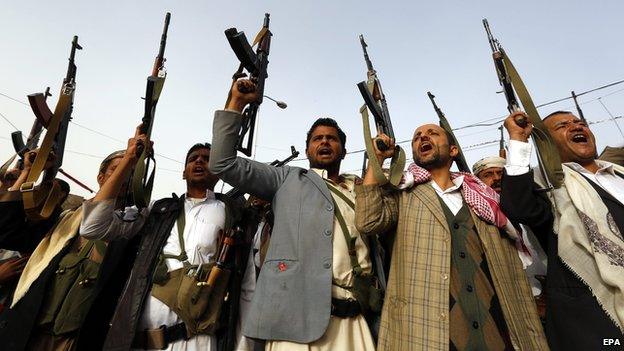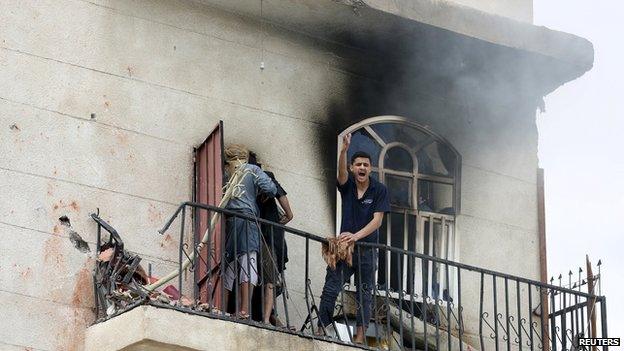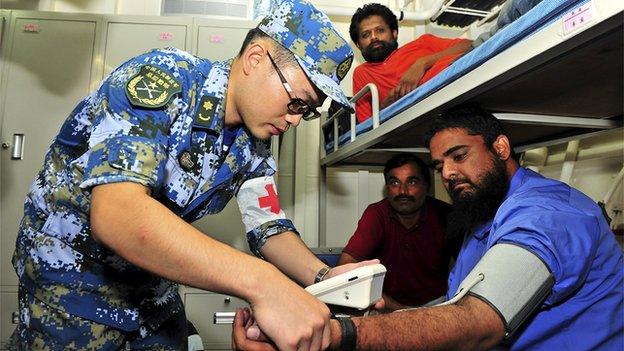Yemen crisis reignites fear of al-Qaeda global threat
- Published

The Houthis may have taken much of Yemen, but AQAP is also taking advantage of the recent crisis
After two weeks of relentless Saudi-led air strikes on Yemen's Houthi rebels and their allies, one of the country's most dangerous factions is now metaphorically rubbing its hands in celebration.
Since the Houthi takeover of half of Yemen, AQAP, short for al-Qaeda in the Arabian Peninsula, has been gaining territory, towns, arms and influence.
It has never had it so good.
US intelligence cites AQAP as the most globally dangerous of all al-Qaeda's regional branches because of its proven ability to smuggle bombs on to planes bound for the West.
So is anything left of the much-vaunted US-led counter-terrorism strategy in Yemen?
"The dynamic in Yemen has changed dramatically," says Dr Sajjan Gohel, a terrorism expert with the Asia Pacific Foundation.
"The current internal strife in Yemen is giving AQAP a breathing space allowing them to raid jails, free (jihadist) prisoners and increase the numbers of their recruits".
Complex battle lines
It seems incredible now, given the violence raging across Yemen on so many fronts, that only a few months ago President Barack Obama was holding up US-Yemeni co-operation against al-Qaeda as a model for counter-terrorism.
In fact it was far from ideal.
A combination of Saudi and Yemeni intelligence on the ground, US electronic intercepts and satellite surveillance allowed the CIA to select targets to be hit by drones in remote parts of the south and east of the country that were mostly inaccessible by the Yemeni military.

Yemen has been hit by two weeks of Saudi-led air strikes
These UAV strikes by unmanned Reapers and Predators, launched variously from discrete runways in Saudi Arabia, Yemen and Djibouti, were certainly keeping AQAP on the back foot, reducing its leaders' ability to stay in one place for long and plan big attacks.
But the drone strikes have also killed many Yemeni civilians and they have been hugely resented by local tribes.
Today, in the worst of all scenarios, the drone strikes may well resume, but without the benefit of having eyes and ears on the ground.
This leaves the US with two options: either give up and leave AQAP alone, which is unlikely, or continue the drone strikes with the dramatically increased risk of civilian casualties.
Eventually, as is often the way in the Middle East, Yemen will settle down into an uneasy compromise between competing factions. The US, as the global superpower, may even be able to find a new partner on the ground.
But for now that prospect looks unlikely as Yemen's battle lines become ever more complex.
The Saudis have their attention fully focused on trying to defeat the Shia Houthi rebels and their allies, or at least bomb them towards the negotiating table.
Their other enemy in Yemen, AQAP, is now a secondary priority, although a Saudi adviser tells me they have not forgotten about them.
But the Saudis are busy attempting, belatedly, to reverse the blitzkrieg takeover of half the country by a group, the Houthis, who the Saudis insist is backed by their historic rival, Iran.
Power-broker
The Houthis, who are now effectively in power in most of Yemen, declare themselves to be staunchly anti-Western.
Their slogan, seen everywhere at demonstrations, includes the words: "Death to America. Death to Israel. A Curse upon the Jews. Victory to Islam". So, not much scope for US-Yemeni co-operation there then.

The real power-broker in Yemen is the former president, Ali Abdullah Saleh.
Pushed out of office by the Arab Spring protests in 2013, he never left the country and Yemenis say he still thinks it cannot cope without him.
He has certainly done his best to make sure it is ungovernable by his successor.
Mr Saleh, who was in power in some form for 35 years, commands the loyalty of much, if not most, of Yemen's police and armed forces.
It is with their help that the Houthi rebels have been able to seize so much territory.
Mr Saleh was, for years, a trusted counter-terrorism partner of Washington.
He authorised the very first CIA drone strike in Yemen back in 2002.
Since then teams of US Special Forces trainers have rotated through Yemen, mentoring and advising his Special Forces to fight al-Qaeda.
Today some of those very forces are on the receiving end of US-made precision guided missiles supplied to the Royal Saudi Air Force. Such is the mess Yemen is in.
The southern Yemenis who have been defending Aden against the advancing Houthis are not organised or cohesive enough to be serious national partners. Many of them anyway are untrained civilians who had never picked up a gun until last month.
Bomb-makers
That leaves al-Qaeda, newly resurgent in the wild eastern half of the country.
Already it has taken over much of the Indian Ocean port of Mukalla and boasted of having infiltrated fighters into Aden.
More than once they have detonated devastating suicide bombs in the capital Sanaa, killing dozens at a time.
With the Shia Houthis, their sectarian enemies, in power, there are likely to be more bombings as AQAP tries to recruit the Sunni tribes to their cause.
AQAP has two agendas.
One is local, within Yemen's borders, and is all about taking territory, attacking the government, raiding armouries and building a support base among the tribes.
The other, which so worries Washington and London, is global.
Due to the bomb-making skills of a Saudi engineer, Ibrahim al-Asiri, a small cell of technicians within AQAP has become frighteningly proficient at designing "Artfully Concealed Explosive Devices" inside objects smuggled on to West-bound airliners.
With the pressure on AQAP now temporarily lifted there are fears those bomb-makers may now have the freedom to make some long-term plans.
- Published3 April 2015
